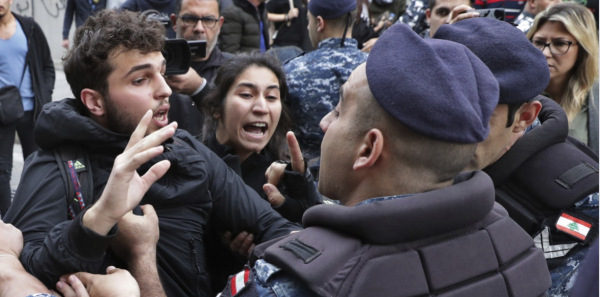The Lebanese uprising continues
The rising in Lebanon is one of several across the Middle East region with a revolutionary character. A long history of exploitation has led to the deepening of social contradictions and resulted in high rates of poverty, unemployment, emigration, poor services as well as a significant heightening of inequality.
Since the end of the civil war in 1990 Lebanon has been subjected to an alliance between its capitalist class, led by the banks and the financial sector, and the leaders of the sectarian militias that have hitherto controlled Lebanon’s religiously fractured population.
Since then the neoliberal policies adopted by consecutive governments have led to a deep deterioration in the country’s productive sectors, industry and agriculture.
The post-1990 coalition claimed that Lebanon could re-emerge as a financial and trade hub between the East and the West as it used to be a few decades ago. This has been a mere cover to pursue an economic agenda based on rents and consumption. It has been fuelled by internal and foreign borrowing to finance infrastructure projects — enabling the financial sector and big capital to thrive at the expense of the whole economy.
High levels of corruption have allowed the heads of sectarian militias, now the political leaders of the country, to raise huge fortunes and emerge as billionaires at the expense of public resources. A key by-product of these sectarian politics has been political clientelism. Basic services, such as health, education and public employment are now selectively and corruptly provided for supporters and loyalists.
Within a couple of decades Lebanon has been turned into one of the most heavily indebted countries in in the world with a public debt reaching 160 per cent of its GDP. One per cent of bank accounts hold 52 per cent of all deposits and out of three million bank accounts just 1,200 contain $30 billion.
This illustrates the depth of class differences in Lebanon and the amount of money accumulated by the richest class within the last few decades. Poverty stands at 33 per cent. The recent 25 per cent increase in the price of basic commodities is estimated to push levels of poverty up to 51 per cent.
Lebanon’s economy is currently entering a recession. Its currency has been devalued and purchasing power is collapsing. In 2018, as a result of the scale of borrowing and the interest payments due, the budget deficit reached 11 per cent of GDP.
In order to lower the deficit to 7.6 per cent in 2019 and to less than 6 per cent in 2020 the government proposed to impose taxes on fuel, WhatsApp social media calls and pensions. As always, it protected the interests of big capital, the billionaires, the banks and their friends.
This triggered a huge wave of anger that eventually exploded into a country-wide uprising with a revolutionary character. It has unified the Lebanese people, across all religious groups, on a class basis for the first time in recent history.
About one third of the Lebanese population took to the streets in all regions starting on October 17, just after the imposition of the new taxes. The slogans quickly evolved from opposing the taxes to the call for regime change, an end to sectarianism and exploitation and the resignation of the government and all the country’s leaders.
A particular slogan that was widely used was “all means all” emphasising that the people wanted all leaders to be removed with no exception on sectarian or partisan bases.
Secular and left-wing forces were actively present from the first day of this uprising and called on their members and supporters to mobilise with their full capacity, side by side with the workers, students, the unemployed and the middle class in revolt.
A road map for change was suggested that included the immediate resignation of the government, the formation of a transitional government from activists and experts who do not belong to the ruling parties, with special legislative powers enabling them to:
Draft an economic contingency plan to save the economy and protect the poor and middle class.
Draft a new non-sectarian electoral law with proportional representation.
Organise a snap election within six months based on this new electoral law.
By October 29 this massive popular uprising had succeeded in forcing the resignation of the government. However, the ruling parties have been trying to marginalise the rest of the demands of the people by attempting to form a cabinet including what they call “technocrat” ministers, who would still be politically affiliated to them.
The blockading of parliament on November 19 succeeded in preventing its meeting. It did so because its agenda did not include the demands of the people.
The country remains with no government. The people remain in the streets all over the country and the struggle with the ruling coalition continues with no clear final outcomes.
It has marked a defeat for the politicians in power and reinforced the people’s confidence in their own power, efficiency and the potential of their movement.
The people of Lebanon have therefore already succeeded. They have succeeded in achieving unity, in the eradicating fake sectarian boundaries, in reaching class consciousness and, most importantly, they have overcome fear — raising real hopes that change is imminent.
It is only the beginning. The people proved that they can, and that they will, secure change. Class struggle is no longer a myth and sectarianism is no longer a miraculous tool to divide the people and conquer them. The economic crisis is deepening and so is the popular struggle.

